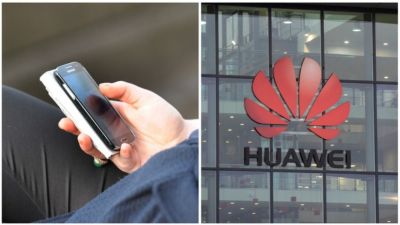Google blocks Huawei from using apps on phones

Google has confirmed it has blocked Huawei from updating some parts of its Android software used on Huawei phones to comply with a US government order blacklisting the Chinese firm.
Fears that the Chinese government could use Huawei as a "back door" to enable it to spy on or the communications networks of other countries are thought to be the reason behind the move, which follows an order by US President Donald Trump aimed at banning Huawei’s equipment from US networks over such fears.
The tech giant confirmed it was "complying with the order and reviewing the implications", but assured Huawei users that their current phones would continue to work.
Last week, US President Donald Trump signed an executive order effectively banning the Chinese firm from using US technology without government permission.
"For users of our services, Google Play and the security protections from Google Play Protect will continue to function on existing Huawei devices," a Google spokesperson said.
The block is likely to prevent future updates to Android reaching Huawei devices.
Key Google apps such as the Google Play Store, Gmail and Google Maps may also not appear on future Huawei devices.
Donald Trump issues order to protect US communications from foreign adversaries after Huawei warning
Instead, the Chinese firm would be reliant on the version of Android available through an open source licence, which is vastly more limited in its features.
"Huawei has made substantial contributions to the development and growth of Android around the world," the Chinese company said in a statement.
"As one of Android's key global partners, we have worked closely with their open-source platform to develop an ecosystem that has benefited both users and the industry.
"Huawei will continue to provide security updates and after sales services to all existing Huawei and Honor smartphone and tablet products covering those which have been sold or are still in stock globally.
"We will continue to build a safe and sustainable software ecosystem, in order to provide the best experience for all users globally."
In recent months, Huawei has come under criticism for its alleged close ties to the Chinese state.
The country has a history of state censorship and surveillance, such as the “Great Firewall of China” which blocks multiple internet services in the country, and under Chinese law, firms are compelled to “support, co-operate with and collaborate in national intelligence work”.
Some critics have expressed concerns that Beijing could require the firm to install technological “back doors” to enable it to spy on or disable Britain’s communications network.
However, the firm has always denied any suggestions of close links with the state or that it has ever been asked by Chinese authorities to help spy on others.
Earlier in May, Huawei board chairman Dr Liang Hua said the company would agree to sign a “no-spy” agreement with countries to fend off suggestions that it could be used by the Chinese state as a route to spy on the West.
Industry analyst Ben Wood from CCS Insight, which provides market information, analysis and intelligence for companies focusing on mobile, said the cut-off could have "considerable implications" for Huawei's gadgets business.
"We still don't have a clear understanding of what Google has told Huawei and what elements of the Android operating system may be restricted, so it remains unclear what the ramifications will be," he said.
"However, any disruption in getting updates to the software or the associated applications would have considerable implications for Huawei's consumer device business.
"People who currently own Huawei smartphones do not need to worry.
"At present any measures would only affect future devices and future updates.
"Google has publicly stated that its App Store, Google Play, and security updates from Google Play Protect will continue working on existing Huawei devices.
"However, until we have a clear understanding of what exact measures Google has decided to take it is impossible to second-guess the impact on future devices."
Huawei has previously confirmed it has been working on its own mobile operating system for use in the event of such blocks, something Mr Wood said now appeared likely.
"Huawei has been working hard on developing its own App Gallery and other software assets in a similar manner to the work it has done on developing its own chipsets for phones," he said.
"There is little doubt these efforts are part of its desire to control its own destiny.
"Last year, CCS Insight predicted that tensions between China and the US would present a strong incentive for Chinese companies to create their own operating system for smart devices.
"Given recent developments that seems more likely than ever."
The UK Government has said it is yet to make a decision on whether to allow another part of Huawei's business, its telecoms equipment, to be a part of new 5G networks in the UK.
Retired brigadier general Robert Spalding, the former senior director for strategy at the National Security Council, wrote in the Daily Telegraph that the UK "must recognise" the strength of US feeling on Huawei.
He wrote: "Other nations must not make the mistake of thinking President Trump's recent executive order banning companies like Huawei from US networks is merely an afterthought of the trade war.
"The severity of President Trump's declaration underscores just how seriously the US views this issue, and the UK must recognise this strength of feeling."